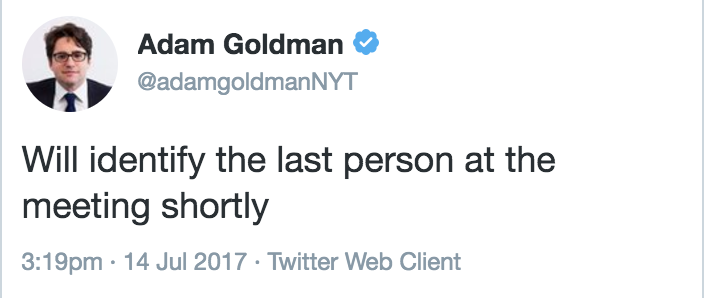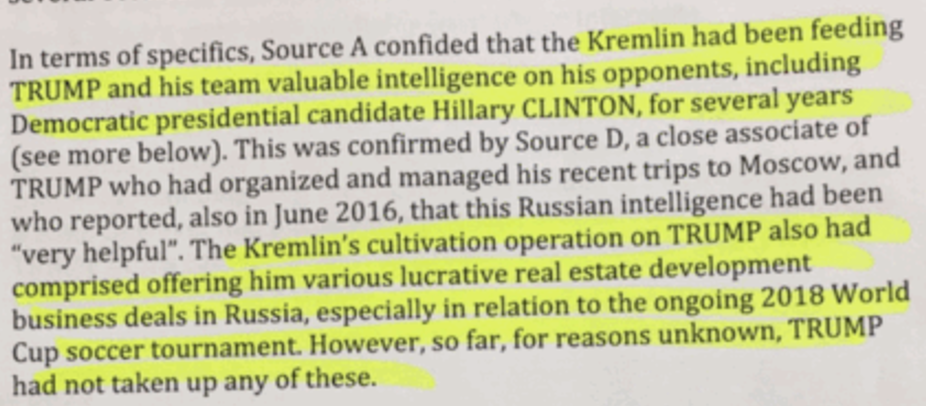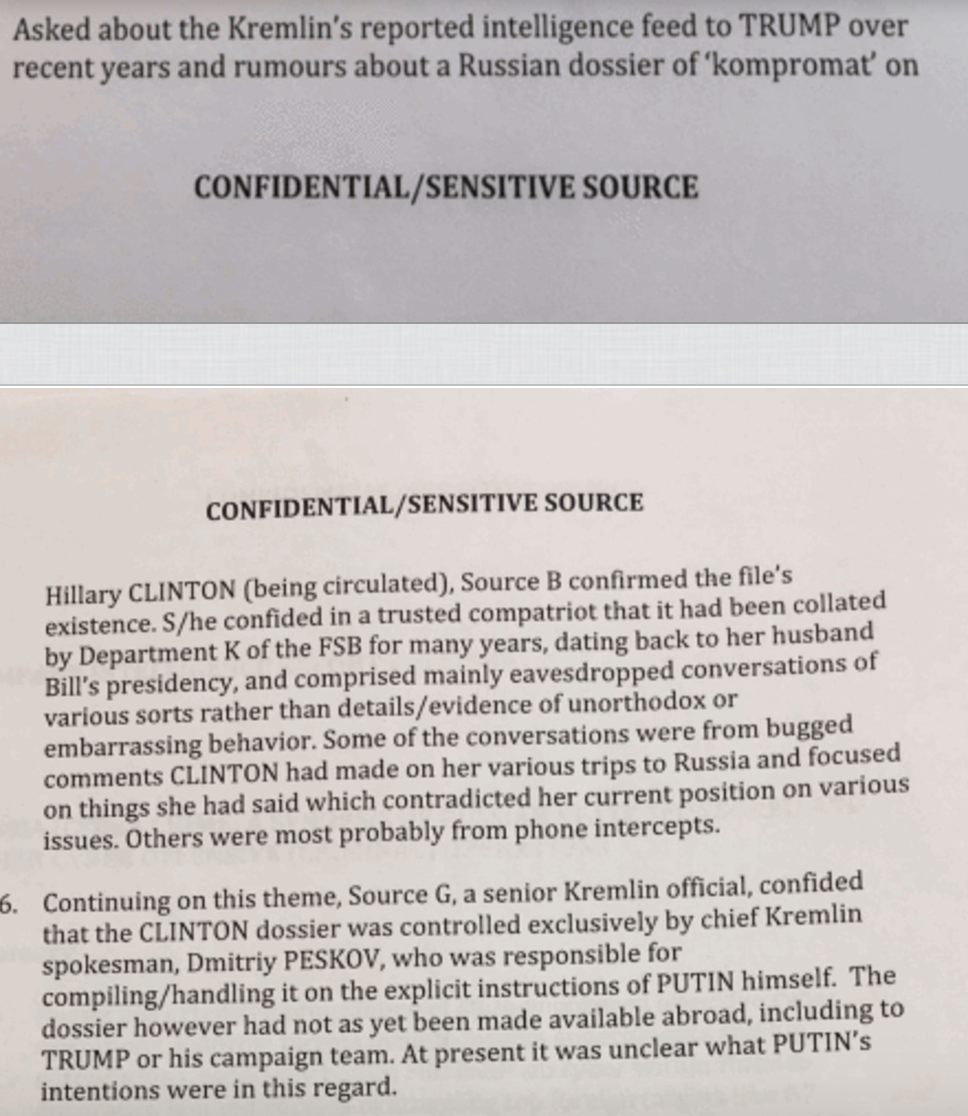Akhmetshin’s Involvement and the Trump Dossier
Over the course of the slow reveal of details about the meeting Don Jr., Jared Kushner, and Paul Manafort had on June 9, 2016 with Natalia Veselnitskaya, the focus has rightly been on the changing stories of the initially identified players.
It was about adoption, maybe she made some vague statements, oh yeah, those vague statements were oppo research, yes, yes, here are the emails showing that oppo research came from an affirmative effort in Russia to elect Dad, how can a ‘good boy‘ be expected to remember all the Russians involved in a meeting? Don Jr. blathered until, perhaps, his newly-hired lawyer shut him up.
I have no ties to the Russian government, I had no damaging information and if I did I had no intention of leaving it, well, maybe I did get information directly from a top Russian prosecutor, explained Veselnitskaya over the course of the week.
I accidentally hit send, I met with no foreigners, maybe there were Russians, but not Veselnitskaya, oh yeah, maybe her too, my lawyers told Pop’s lawyers, well maybe I never got around to mentioning it to him personally, the tale of Kushner’s difficulties identifying all the Russians he met with evolved over the week, at which point Jamie Gorelick removed herself from any responsibility criminally defending the guy.
All of which climaxed in the news that former Russian intelligence officer Rinat Akhmetshin and accused (before the accusation was withdrawn) hacker also attended the meeting.
Akhmetshin has boasted to associates that he had served in the military with a group known as the Osoby Otdel, or Special Section, which in the Soviet period was a division of the K.G.B. The group was distinct from the G.R.U., or Main Intelligence Directorate of the defense ministry, an organization with which he has denied any affiliation.
[snip]
The Justice Department contacted Mr. Akhmetshin in March and asked him why he did not register his work for the nonprofit group under the Foreign Agent Registration Act, which requires anyone who lobbies in the United States on behalf of foreign interests to disclose their work to the Justice Department. Mr. Akhmetshin responded to the Justice Department in April, saying he had properly registered under congressional lobbying rules.
In 2015, International Mineral Resources, a mining company based in the Netherlands, accused Mr. Akhmetshin of hacking into its computer systems, stealing confidential information and unlawfully disseminating it as part of a smear campaign orchestrated by a rival Russian mining firm.
All of which, given that the meeting took place a week before hacked emails started coming out, sure makes it look like the principals were deliberately hiding Akhmetshin’s participation in the meeting, though Akhmetshin claims he got pulled into the meeting that day, still wearing his jeans and t-shirt.
He said he had learned about the meeting only that day when Veselnitskaya asked him to attend. He said he showed up in jeans and a T-shirt.
Given all these changing stories and what they might hide I’d like to return to Don Sr.’s initial response. Way back on Sunday, the spox for Trump’s lawyers (who reportedly had known of these emails for three weeks) claimed the meeting had been a set-up by the same intelligence firm, Fusion GPS, that put together the Trump dossier.
“We have learned from both our own investigation and public reports that the participants in the meeting misrepresented who they were and who they worked for,” Mark Corallo, spokesperson for Trump’s outside counsel, said in a statement released a few hours after the original New York Times story published.
“Specifically, we have learned that the person who sought the meeting is associated with Fusion GPS, a firm which according to public reports, was retained by Democratic operatives to develop opposition research on the president and which commissioned the phony Steele dossier,” Corallo continued, referring to the strategic intelligence firm hired by anti-Trump Republicans, then by Democrats, to do opposition research on the candidate.
(Fusion GPS eventually retained former MI-6 agent Christopher Steele to research potential connections between Trump and Russia, an investigation that resulted in a dossier that alleged financial, political, and personal connections between the then-president-elect and the Kremlin—a dossier that Trump’s communications team might have preferred to go unmentioned.)
“These developments raise serious issues as to exactly who authorized and participated in any effort by Russian nationals to influence our election in any manner,” Corallo concluded.
Even as all this was happening, Chuck Grassley released a testimony list suggesting the head of Fusion GPS, Glenn Simpson, would testify aside the key player accusing Akhmetshin of unlawfully lobbying for Russia, William Browder. But Simpson continues, as he started in June, to refuse to testify willingly.
The insinuation this meeting was all a set-up by a Clinton-surrogate was absolutely a cheap attempt, worthy of Corallo, to flip this story. But as I said earlier in this week, it’s more clever than first assumed. As I noted, a full eleven days after the meeting (and five days after the first stolen documents appeared), Fusion was still presenting conflicting details about whether Russian-derived Clinton dirt had been shared with Trump’s campaign, ultimately claiming, however, that it hadn’t.
The report, dated 11 days after the Veselnitskaya meeting, states that the Kremlin has a dossier on Clinton, but that it has not as yet been distributed abroad.
That claim is seemingly contradicted by the claims of Source A (a senior Russian Foreign Ministry figure) and Source D. Indeed, Source D appears to have claimed, in June, that dirt from Russia was helpful.
Ultimately, though, the memo seems to credit Source B, “a former top level Russian intelligence officer” and Source G, a senior Kremlin official, who said the dossier, attributed here to the FSB, had not yet been shared with Trump or anyone else in America.
Consider: First, Akhmetshin himself qualifies as a former intelligence officer (though it’s not clear how senior he was). He might have reason to deny that intelligence he tried to pass was the intelligence in question. And he’d likely be right, given that the Clinton dossier was purportedly a FSB, not a GRU, product. But it’s even possible that he didn’t want Hillary to know that he or a colleague was dealing dirt, however bad.
Nevertheless, the senior-most Russian quoted in the dossier compiled for Hillary Clinton claimed — and Steele appears to have believed — that Russia’s dirt on Hillary Clinton had not yet been released.
As I noted (and others have expanded elsewhere) some of these sources could be people who attended the meeting, particularly once we learn which Agalarov was involved and how closely.
It is definitely cheap to suggest that having three principals from Trump’s campaign meet with Russians claiming to represent the wishes of the Russian government is just an opposition plot invented by a Hillary surrogate. But the feedback loop within Fusion and the narrow circle of key Russian sources on Trump’s campaign is definitely worth considering.





